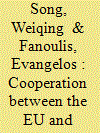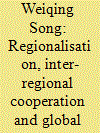| Srl | Item |
| 1 |
ID:
183715


|
|
|
|
|
| Summary/Abstract |
The European Union's partnership with China has received significant academic attention. Experts have focused on both parties’ economic and political objectives and have made efforts to grasp the dynamics of the institutionalisation of EU-China cooperation. However, little has been said about how this collaboration affects the lives of citizens, especially in China. Adopting a Foucauldian epistemology, this article's key contention is that EU-China cooperation imposes a joint form of post-liberal governmental power on the Chinese population, which socially constructs empowered but not liberal political subjectivities for Chinese citizens. The article first reviews Foucault's approach to governmentality. It then explores Sino-EUropean collaboration after 2013, when the two partners established the ‘EU-China 2020 Strategic Agenda for Cooperation’. We illustrate how the institutionalisation of the partnership has been consistent with a governmentalised political rationality, and how policy implementation has allowed a post-liberal form of governmental power to flow from both EU and Chinese policymakers towards the Chinese population, triggering processes of political subjectivisation.
|
|
|
|
|
|
|
|
|
|
|
|
|
|
|
|
| 2 |
ID:
077400


|
|
|
|
|
| Publication |
2007.
|
| Summary/Abstract |
The contradiction between trans-boundary issues largely driven by globalisation and conventional authority based on sovereign state leads to the problem of global governance. Regionalisation emerges as a process in which nation states within geographic proximity take collective measures to cope with problems of global governance. With the increasing tendencies of regional cooperation, a new issue thus arises as to the interaction among regions. In fact, the more regionalized the world, the more necessary, enabled and willing for regions to construct connections with each other. Inter-regionalism and trans-regionalism therefore become a further step which regional blocks take to build one layer in the hierarchy of global governance. The paper takes the Asia-Europe Meeting as the case to analyze the above thesis. In the first section, it presents the observation that the global system is characterized with regionalisation, then analyzes the coordination problems facing regions interdependent upon one another and then formulates a modified framework for analysis of the Asia-Europe Meeting. In the second section of rational design, it analyzes the process in which Europe and Asia rationally establish the cooperation structure of ASEM as a means to tackle the coordination issues between the two regions. In the third section of governing globalisation, it discusses the effects and implications of ASEM's contribution towards global governance mainly in ways of rationalizing international relations and strengthening regional identity in the era of globalisation
|
|
|
|
|
|
|
|
|
|
|
|
|
|
|
|